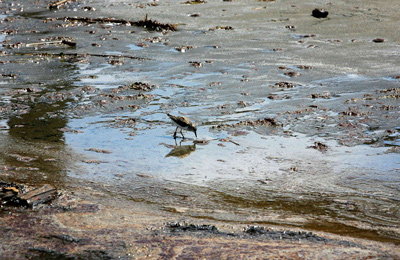|
BP oil leak offers 'lesson in humility' and 'limits of technology' |
|
|
|
Catholic News Service |
|
The "sense of powerlessness and
delay" in resolving the worst offshore
oil spill in
U.S. history offers a lesson about
the limits of technology, a Vatican
official said. "What is striking in this case is the sense of powerlessness and delay in finding a solution to this disaster faced by one of the largest and most technologically advanced oil multinationals in the world, but also by the most powerful country on earth," Father Lombardi said.
|
|
"It seems incredible, but it is a fact. This
is not the eruption of a volcano, but a
relatively small man-made hole in the
seabed. Yet, in two months, expert
scientists and technicians, leaders in their
field, have failed to plug it," he said.
The Vatican spokesman said
he hoped people would draw from the disaster
a lesson of prudence
and care in the use of the earth's
resources.
"Perhaps we can also draw a lesson in
humility," he said.
"Technology will advance. But if a
relatively simple production process leaves
us so helpless, what will we do if much more
complex processes get out of hand, such as
those affecting the energy hidden in the
heart of matter or moreover in the processes
of the formation of life?" he said.
Father Lombardi noted that the issue of responsible
use of technology was
addressed by Pope
Benedict XVI in
his latest encyclical, "Caritas in Veritate"
("Charity in Truth").
Belgaum Priest Wins Top Protestant Ecumenical HR Award
Coutesy CSF
A Catholic
priest working
in India’s
Karnataka state has been selected for a human
rights award instituted
in memory of a Protestant clergyman. Father
P. J. Jacob from Belgaum diocese is the
first Catholic priest to be conferred the M.
A. Thomas National Human Rights Award. He
will receive a citation and cash prize of
100,000 rupees (US$2,174) in Bangalore in
August. Father Jacob, founder of the
Vimochana (liberation) Development Society,
has “contributed immensely” toward social
justice and
“consistently promoted” people’s rights for
45 years, the Vigil
India Movement (VIM)
said in a statement. VIM set up the award in
1993 to honor Reverend M. A. Thomas of the Mar Thoma
Church,
who died in 1993 at the age of 80.
Father Jacob, a former member of the state
legislative assembly for a term of five
years, also established institutions to
educate the poor, VIM program manager, John
Juliana said. The human rights award is
given once in two years to an individual or
institution for making significant
contributions in the field of human rights.
Reverend Thomas, an ecumenical leader,
founded VIM and the Ecumenical Christian
Centre in Bangalore.
The Conference of Religious India (CRI) is
to launch a special scheme to prepare new
Indian Religious congregation leaders to
meet challenges posed by the country’s
expected rapid development in the next
decade. “There are many people predicting
that India will be adeveloped country by the
year 2020 and the Catholic Religious will
have to prepare for that,” said Brother Mani
Mekkunnel, CRI national secretary. He said
the conference will organize courses on
“visions for the future” for young Religious
in its 13 regions across India. “We are
planning to bring one Religious aged 30-35
from each region for the program,” Brother
Mekkunnel explained. The first session is
scheduled for July 1-4 at the Renewal Centre
in Kochi, for the Kerala region. The program
will conclude with a national convention in
March, 2011 in Pune, where more than 1,000
young Religious are expected to attend. CRI
represents more than 125,000 Catholic
Religious brothers, priests and nuns in
India. Some 30,000 religious are aged
30–35.
Religious who
participate in the program would become
leaders in their congregations and regions
by the year 2020, Brother Mekkunnel said.
The participants will make a commitment to
seek ways to make Religious life more
relevant in the modern world. They will set
10 goals to achieve this. Many of the
traditional functions done by Religious
today will become irrelevant in the next ten
years, said Brother Mekkunnel. The Religious
will have to look for ways to make their
life meaningful and purposeful, he said,
adding “nothing will be imposed” on the
participants during the program. It would be
a collective search, he added.
